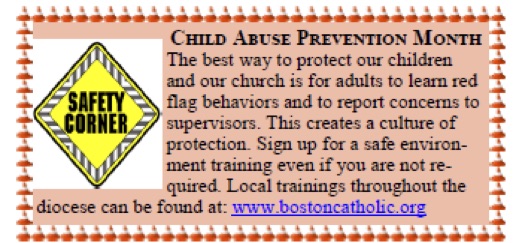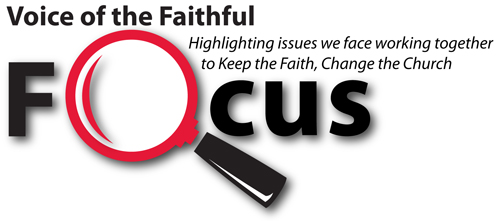
In the Vineyard :: April 5, 2021 :: Volume 21, Issue 7
National News

From all of us at VOTF National, we wish a blessed, peaceful and joyful Easter.
An Easter Prayer (excerpted from prayer by Fr. Larry Snyder)
Good and gracious God, our most glorious Creator,
As we greet the signs in nature around us of Spring
once again regaling us in bloom, in the songs of returning birds and fields soon to be planted, we give you praise for an even greater sign of new life: the resurrection of your Son, Our Lord Jesus Christ, that we celebrate at this time.
The sadness and despair of his death has given way to the bright promise of immortality, for the Resurrection is our guarantee that justice will triumph over treason, Light will overcome darkness, and love will conquer death. As we celebrate we also dare to ask for your grace that we may live the promise given to us, by imitating the life of Jesus in reaching out to the poor, the marginalized, the least among us, ss we strive to be neighbor to all those we meet. …
We praise you in this Easter season. Change our lives, change our hearts to be messengers of Easter joy and hope. We make our prayer through Jesus Christ, our risen Lord forever. Amen.
VOTF’s Mini-Synod: What You Missed
By Ethel Doyle, VOTF member, Arlington MA
Voice of the Faithful conducted a mini-synod, “Emerging from the Pandemic: Ensuring Safe Environments for Children,” on Thursday, March 25, 2021. The purpose of the event was to listen, discuss and learn about good practices in child protection and what parishes are doing to ensure safe environments for children during this pandemic.
Our parishes are the frontline in keeping our children safe.The meeting provided me with an opportunity to learn about the initiatives currently being undertaken by the Protecting Our Children working group. The “Resources and Actions” document that was distributed provided helpful information. Elia Marnik and Patricia Gomez informed the attendees about the nature and scope of their project and how the findings would be presented.
To facilitate discussion, everyone was divided into small groups to reflect on how parishes attend to Child Safety and whether Safety Guidelines and Practices were made public and apparent to parishioners. Also, for consideration were whether parishes had Safety Programs for all age groups and who was responsible for administering them.

The small group discussions brought to light many issues. I learned how parishes deal with safety in different ways, from publishing a “Safety Corner” in their bulletin to establishing a Safety Committee. It appeared that Safety Guidelines and Protocols were available on the Archdiocesan websites, but not necessarily available on local parish websites. We agreed that it was important to have this information presented on parish websites.
[Click here for other Safety Corner examples, courtesy of Julissica Navarro-Norton, Administrator, Holy Family Parish, Concord MA.]
We also agreed that all parish ministry volunteers should be subject to CORI checks and VIRTUS training, even if their work did not directly involve children or youth. It is the responsibility of every parishioner to be vigilant. We strongly felt that all vulnerable people – children, youth, people with disabilities, and the elderly – must be protected.
Some parishes offered seminars on topics such as internet safety and dealing with addiction to raise awareness about issues of concern. A suggestion was made to not only publicize such events in the parish bulletin, but to reach out directly to specific groups such as families involved in Religious Education and Confirmation programs.
Attendees agreed that we need more events like this one where members can learn from each other, share best practices, and support each other in a safe environment. Attending this synod was a worthwhile experience for me; I look forward to participating in future mini-synods.
See the VOTF web site for additional information on Child Protection.
Coming Soon: Details on our 2021 Virtual Conference!
Save the dates! October 22-23 is VOTF’s 2021 Conference, Re—Membering the Church: Moving Forward. It’s going to be a virtual conference again this year, to avoid any potential conflicts with pandemic-related restrictions. We’ve already lined up Prof. Massimo Faggiolo and Sr. Carol Zinn, SSJ, as our keynote speakers, and you will also hear from a group running weekly lay-led liturgies. Plus, we will bring back the popular Friday night Zoom chat. Keep your eyes open for more info and registration details.
International News
Vatican Pay Cuts Preserve Jobs
Amid the many challenges of COVID-19, Pope Francis has decided to approve pay cuts for upper-level employees in the Vatican to reduce costs and ensure that all employees are able to keep their jobs.
On March 24 the Vatican issued a decree explaining that as of April 1, cardinals working in the Vatican, clergy, and lay officials in higher pay-grades will see between a 3% and a 10% reduction in their pay. Cardinals will see 10% less each month, department superiors 8%, and upper-level priests and nuns will see 3% less. In addition, the next two years will see a freeze in automatic pay increases for other high-pay-grade employees. The decree also mentioned that reductions may be waived in extenuating circumstances; for example, an employee or close family member of an employee facing extraordinary health expenses.
Cardinals working at the Vatican often live in the Vatican or in Rome, and many enjoy the benefits of large apartments rented below market rate. Other religious officials, including priests and nuns, live in religious communities which also protects them from some of the challenges that come with economic downturns.
The Pope based this decision seeing deficits each year and the particular decrease in revenue due to the COVID-19 pandemic. In order to prevent lay-offs of those at the lowest pay-grades, he approved these measures “according to criteria of proportionality and progressivity.”
Amid decreased donations and lower-than-usual tourist dollars due to the pandemic which has “negatively influenced all sources of income for the Holy See and Vatican City State,” the Pope has decided to prioritize maintaining all employees and continuing the mission of the Church over increasing salaries of those already making the highest monthly salaries. In terms of transparency, Mimmo Muolo, author of “The Church’s Money,” published in 2019, explained that cardinals employed in the Roman Curia, administrative institutions of the Holy See, and Vatican City State have the highest monthly salaries. Their salaries in 2019 ranged from 4000 to 5,000 euros per month, or $4,700 to $5,900. Other official salaries are not published. The Pope himself will not see any decrease in salary because he does not receive one.
The Vatican’s 2021 revenue is estimated to be 30% lower than 2019, the year prior to the pandemic. Much of this is attributable to the necessary closure of St. Peter’s Basilica and the Vatican Museums over the last year. Cost-cutting measures have been taken, including a reduction in travel, overtime, and the postponement of construction and renovations. The Vatican’s top economic official, Rev. Juan Antonio Guerrero Alves, explained that “Pope Francis insists that saving money does not have to mean laying off employees. He is very sensitive to the plight of families” and the cost-cutting measures did not include cutting jobs.
The goal of these cuts is to ensure a sustainable financial future and contribute to the mission of the Church, and the publication of this move is a step in the right direction when it comes to financial transparency.
For more information, please see here, here, and here.
For VOTF’s statement on financial accountability, please see here.
Yet Another Argument for Increasing the Involvement of Lay Women in Priestly Formation, Leadership
In April of 2019, Cardinal Marc Ouellet called for “radical change” via increased involvement of women in the process of priestly formation. Some undergraduate seminary programs were offered jointly with master’s level theological programs, although that is rare presently. Victoria Mastrangelo, a theology teacher at an all-girls Catholic School in Houston,maintains many friendships with priests who she met while studying at the University of Dallas, where Holy Trinity Seminary has a college seminary program, and while completing her master’s degree at the University of St. Thomas in Houston. She explains, “relationality is really huge, and I’ve just seen the fruits of it… how it plays into their ministry.”
Programs where seminarians interact with and share classrooms with women who are pursuing lay ministry vocations are called “integrated formation models.” These models are one way in which men preparing for the priesthood are able to foster friendships with women and encourage healthier, more well-rounded priests. Father Brian Ching, the director of the Old College Undergraduate Seminary and rector of the Basilica of the Sacred Heart at the University of Notre Dame, says that college is a time for young adults to integrate healthy behaviors and the skills necessary for healthy relationships into their lives. He believes that the goal should be to condition men to the world rather than shielding and protecting them from it.
The other benefit of including lay women in priestly formation and including them more in decisions and leadership in the Church as a whole, is that those who go on to become priests have more experience and knowledge of the ways in which lay men and women think and feel, preparing them better to lead them upon entering the priesthood.
These concepts and arguments are challenging, however, and some fear that increased proposals for the involvement of women may cause a schism. The Synodal Path currently ongoing in Germany, for example, is addressing several issues, with many German Catholics taking stances not aligned with those of the Vatican, including the ordination of women. Bishop Georg Bätzing recently mentioned that “arguments against the ordination of women are becoming less and less convincing.”
While arguments for and against the ordination of women and their increased involvement in priestly formation continue, it will be interesting to see how the Synodal Path in Germany plays out, with some liberal voices calling for women’s ordination. Pope Francis’s response to their ultimate decision will undoubtably influence all aspects of priestly formation and ordination, regardless of which stance the Vatican chooses in the end.
For more information, please see here and here.
For VOTF’s statement on women’s roles, please see here.
To read more about women’s roles in the church as discussed in Visions of a Just Church, our conference last fall, please see the recap here.
 TOP STORIES
TOP STORIES
USCCB: Church must build culture of transparency on abuse
“Members of the U.S. bishops’ Committee on the Protection of Children and Young People have agreed with the National Review Board’s call that the Catholic Church must continue to build a culture of accountability and transparency regarding clergy sexual abuse. Bishop James V. Johnson Jr. of Kansas City-St. Joseph, Missouri, committee chairman, said in a statement that the members also agree with the all-lay review board ‘on the need to identify, address and correct systemic failures which hinder the best response to allegations.’’ By Catholic News Service in Florida Catholic Media
Cologne Catholic Church Failed in Handling Sex Abuse Claims, Report Finds
“A Roman Catholic archbishop in Germany offered his resignation and two other high-ranking officials were suspended in the wake of a report that found decades of ‘systematic cover-up’ in the church’s handling of accusations of sexual abuse at the hands of clergy members. The 800-page report, examining the years 1975 to 2018 at the Archdiocese of Cologne, was released on Thursday after five months of intense investigation. It was critical of the actions of Stefan Hesse, who had worked at the Archdiocese of Cologne and is now the archbishop of Hamburg.” By Melissa Eddy, The New York Times
German archbishop offers to resign after abuse criticism, By Kirsten Grieshaber and Daniel Niemann, The Associated Press, in The Boston Globe
Expert report weighs heavily on deceased Cardinal Meisner, By Der Spiegel
Woelki cleared in Cologne abuse report, By Christa Pongratz-Lippitt, The Tablet
Pope names prominent Chilean clerical abuse survivor to Vatican panel
“Pope Francis has appointed a prominent Chilean survivor of clerical sex abuse to a Vatican commission which focuses on education to prevent abuse in the Roman Catholic Church. Juan Carlos Cruz, an international advocate for abuse victims, was abused as a teenager in his native Chile by a notorious paedophile, Father Fernando Karadima.” By KFGO-AM News
Pope Francis names Juan Carlos Cruz, prominent abuse survivor and whistleblower, to Vatican panel, By Gerard O’Connell, America: The Jesuit Review
Former Albany bishop will be investigated under ‘Vos estis’ norms
“An anonymous plaintiff last week filed a lawsuit against former Albany bishop Howard Hubbard, alleging that Hubbard molested him in 1977, soon after his installation as bishop. The diocese of Albany confirmed to CNA on Wednesday (Mar. 24) that Hubbard will be investigated according to Vos estis lux mundi, the procedure for investigating abuse accusations against bishops that Pope Francis promulgated in May 2019. Also named in the suit are the diocese of Albany and St. Edward the Confessor Catholic Church in Clifton Park, New York, north of the city.” By Jonah McKeown, Catholic News Agency
Is Synodal Path in Germany a road to schism?
“In 2019, the German Catholic Church envisioned a ‘Synodal Path’ to try to address the institutional clerical sexual abuse scandal. Bishops, laity, priests, religious and experts were all summoned to find solutions and set forth a reform path that has expanded its scope to question Catholic Church teaching on areas of sexuality. (This is part two of a two part series looking into Germany’s Synodal Path, a process launched by the bishops’ conference in 2019 in an attempt to respond to the clerical sexual abuse crisis. Part one can be found here.) By Inés San Martín, Cruxnow.com
Vatican sanctions two Polish bishops after ‘Vos estis’ investigations
“The apostolic nunciature in Poland announced Monday (Mar. 29) that the Vatican has sanctioned two Polish bishops at the conclusion of canonical inquiries into accusations they were negligent in their handling of sexual abuse of minors by clergy. According to March 29 statements on the website of the Polish Catholic bishops’ conference, Archbishop Sławoj Leszek Głódź and Bishop Edward Janiak have been ordered by the Holy See to live outside their former dioceses, and told they cannot participate in public liturgies or non-religious gatherings within the territory of the dioceses.” By Hannah Brockhaus, Catholic News Agency
Click here to read the rest of this issue of Focus …
Comments?
Please send them to Siobhan Carroll, Vineyard Editor, at Vineyard@votf.org. Unless otherwise indicated, I will assume comments can be published as Letters to the Editor.
Reminder: Please notify office@votf.org if you change your email address.
© Voice of the Faithful 2021. All Rights Reserved.
